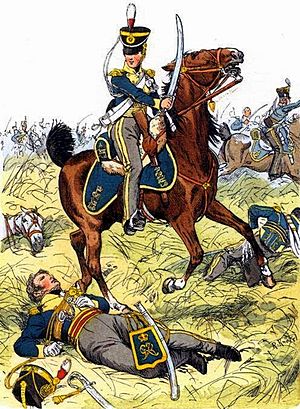Combat of Navas de Membrillo facts for kids
The Combat of Navas de Membrillo was a small but important battle. It happened on December 29, 1811, near Mérida, Spain. In this fight, British cavalry led by General Rowland Hill attacked a smaller French group. The French soldiers, led by Captain Neveux, formed a strong defensive square. They managed to defeat the British cavalry. One historian, Ian Fletcher, called this event "one of the more disappointing cavalry episodes in the Peninsula." This battle was part of the larger Peninsular War.
Quick facts for kids Combat of Navas de Membrillo |
|||||||
|---|---|---|---|---|---|---|---|
| Part of the Peninsular War | |||||||
|
|||||||
| Belligerents | |||||||
| Commanders and leaders | |||||||
| Strength | |||||||
| c. 400 | Unknown | ||||||
| Casualties and losses | |||||||
| 11 killed, wounded or captured | 39–40 killed, wounded or captured | ||||||
Why This Battle Happened
In late 1811, Viscount Wellington was the leader of the British and Portuguese armies. He wanted to draw attention away from the French forces. These French forces, led by Marshal Jean-de-Dieu Soult, were busy with the Siege of Tarifa.
So, Wellington asked Major-General Rowland Hill to attack a French group. This group was the 5th Infantry Division, led by General Ludwik Mateusz Dembowski. They were located in Mérida.
Hill set out for Spain with 12,000 soldiers on December 27. The next day, they reached the village of La Rocca. This village was about 30 kilometers from Mérida. At the same time, a small French force was also moving in that direction. They were looking for food supplies. This French group had about 400 men. It included three companies of the French 88th Infantry Regiment. Captain Neveux led them, along with some hussars (light cavalry).
What Happened During the Fight
On December 29, Hill's leading soldiers met the French hussars. This happened near the village of Navas de Membrillo. The hussars quickly told Captain Neveux what was happening. Neveux decided to pull his troops back towards Mérida.
General Hill saw the French retreating. He had no infantry (foot soldiers) with him at that moment. So, he ordered his cavalry to chase the French. The British cavalry included the 2nd Hussars Regiment from the King's German Legion. It also had two squadrons (groups) of the 13th Light Dragoons.
They charged at Neveux's troops. But the French soldiers quickly formed a defensive square. They did this in a wood. The cork trees in the wood protected the French soldiers. The trees also made it hard for the British cavalry to attack. The British cavalry became disorganized. The French square fired their weapons very well. They pushed back the British light cavalry five times.
Even though British artillery arrived later, Neveux's men managed to escape. They successfully retreated back towards Mérida.
 | Lonnie Johnson |
 | Granville Woods |
 | Lewis Howard Latimer |
 | James West |


